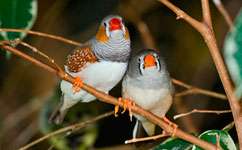Flight speed is affected by diet in early life

A good start in early life means everything, and not just for children cajoled into eating their vegetables. Zebra finches that grew up on a poor diet may catch up in weight and size, but become slower to escape predators after a breeding cycle.
Raising a bird family in the wild can be a mixed blessing. On one hand, looking after the brood is a way to make sure that the nestlings survive and carry the successful genes into the future. On the other, so much hard work has consequences for the parents' survival.
'Each time you invest energy in reproduction, you are not investing the limited amount of available energy in body maintenance, or you are exposed to higher predation,' says François Criscuolo, a biologist based at the University of Strasbourg.
Females in particular pay a hefty cost, since they have to invest proteins from their own body to produce the eggs. One of the sources of these proteins is the pectoral muscle in the chest and, 'as a consequence, reproduction is costly in term of flight ability,' he explains.
Criscuolo and his colleagues from the University of Glasgow set out to understand how early life conditions affect the cost of reproduction in birds, focussing on one parameter: the escape flight speed. To do that, they tampered with the food given to 190 zebra finch nestlings during the first 30 days of their life - the most important period in terms of growth.
Half of the birdies were kept on either a poor or a rich diet in terms of protein content for the first two weeks, including hard-boiled hen eggs (extra proteins), fresh spinach and vitamin supplements in addition to their standard rations. After a fortnight, the team switched diets for half of the birds for another 15 days.
At the end of the month, they had four groups of birds: LL and HH - zebra finches fed with a low- and high-protein diet for the whole period, LH - birds that were first fed standard and then upgraded to an improved half way, and HL - the nestlings that lost access to the extras after two weeks.
The results, reported in the journal Oecologia, show that birds raised with a low diet were lighter and had smaller wings when they were 15 days old. But the switch to an improved diet allowed the LH birds to recover and reach the same weight and wing length as the HH group at the end of the month. After 100 days, there were no weight or size differences between the birds. Apparently, the diet in early life had no consequences.
The advantages of a good early life start began to emerge when Criscuolo and colleagues measured the escape speed of all the zebra finches before and after one breeding cycle.
As expected, all birds became slower after going through the effort of raising a brood. But the team found that females from the LH group suffered the most in terms of speed - after breeding, they took significantly longer to reach a given height following a ground take-off.
These females were kept on low protein rations at a formative period in their early life and only later upgraded to an improved diet. They achieved the same weight and wing length than the HH group but 'when birds have to catch-up during growth, they suffer from a higher cost of reproduction which is reflected by a lower flight speed,' says Criscuolo.
The results support previous observations that growing at a higher speed than normal after a bad start has long term effects, 'maybe more than growing at a lower than normal rate throughout the growing period,' he concludes.
This story is republished courtesy of Planet Earth online, a free, companion website to the award-winning magazine Planet Earth published and funded by the Natural Environment Research Council (NERC).
More information: François Criscuolo, et al. Costs of compensation: effect of early life conditions and reproduction on flight performance in zebra finches. Oecologia DOI:10.1007/s00442-011-1986-0
Provided by PlanetEarth Online











.jpeg)


